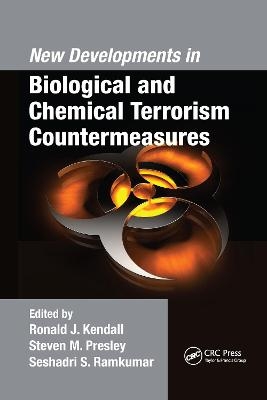
New Developments in Biological and Chemical Terrorism Countermeasures
CRC Press (Verlag)
978-0-367-77885-9 (ISBN)
A science-based text, New Developments in Biological and Chemical Terrorism Countermeasures presents research that addresses the growing threat of chemical and biological terrorism as well as the need for improvements in the implementation of countermeasures. This new textbook building upon Advances in Biological and Chemical Terrorism Countermeasures is the product of more than a decade of synthesizing newly acquired information through extensive research and development supported by the United States Army through Texas Tech University’s Admiral Elmo R. Zumwalt, Jr. National Program for Countermeasures to Biological and Chemical Threats.
The book describes and expands upon threats, vulnerabilities, and pathogenic and toxic effects associated with agents used in biological and chemical terrorism. Among the discussions of agents is an exceptionally thorough examination of ricin history, toxicity, adsorption, and mobility. It also gives an overview of protective gear and in-depth perspectives on future research needs, including identifying challenges and paths forward in predicting risks.
Effective countermeasures to biological and chemical threats are becoming increasingly necessary. New Developments in Biological and Chemical Terrorism Countermeasures provides a cutting-edge source addressing and advancing this need. It offers strategies and expert viewpoints toward improving defenses against threats in the United States as well as other nations.
Ronald J. Kendall is a professor of environmental toxicology at Texas Tech University (TTU), Lubbock, and is leading a new major initiative in wildlife toxicology. He is director emeritus and founding director of The Institute of Environmental and Human Health (TIEHH), a joint venture between TTU and the TTU Health Sciences Center. He was also the founding department chair of the Department of Environmental Toxicology at TTU. For over a decade, he has served as Principal Investigator of the Admiral Elmo R. Zumwalt, Jr. National Program for Countermeasures to Biological and Chemical Threats at Texas Tech University. He earned his PhD from Virginia Polytechnic Institute and State University. He is a former president of the Society of Environmental Toxicology and Chemistry and has been an editor and/or on the editorial board of the scientific journal Environmental Toxicology and Chemistry since 1986. He has more than 200 publications and technical articles in wildlife and environmental toxicology, has received numerous awards, has addressed the United Nations Committee on sustainable development, and has consulted with many foreign countries on environmental issues. Steven M. Presley is a professor and director of the Biological Threat Research Laboratory at Texas Tech University. He earned his PhD from Oklahoma State University, studying medical/veterinary entomology, after which he served as a Medical Service Corps officer in the United States Navy. His research and teaching focus on risks and threats associated with and the potential impact of biological pathogens naturally or intentionally introduced into military and civilian populations and the agricultural industry. He has led malaria control operations and research efforts in Africa, Asia, and South America, as well as Rift Valley fever, Crimean Congo hemorrhagic fever, and cutaneous leishmaniasis studies in Africa and Asia. He has published numerous scientific and technical manuscripts and has made numerous professional and technical oral presentations relevant to zoonotic disease threats. He is the chairperson of the Publications Committee and serves on the Science and Technology Committee of the American Mosquito Control Association, is the Southcentral Regional Director for the Society for Vector Ecology, and is also a member of many local, regional, and state professional boards and committees related to emergency preparedness and public health response to human and animal diseases and catastrophic events. Seshadri Ramkumar is a full professor at Texas Tech University (TTU), Lubbock. His research focuses on developing value-added materials using nonwoven and nanotechnology. He supervises the Nonwoven and Advanced Materials Laboratory at The Institute of Environmental and Human Health at TTU. He holds two US patents and two US pending applications. He is the editor of Nonwoven and Technical Textiles, a comprehensive magazine on technical textiles. He also serves on the editorial boards of three international peer-reviewed journals. He is the co-chairman of The Association of Nonwoven Industry’s India committee and has successfully organized four international conferences on advances in fibrous materials. His research on nonwoven decontamination wipe has resulted in a technology transfer that is pending commercialization.
State of the Science: Background, History, and Current Threats. Challenges and Paths Forward in Predicting Risk of Vector-Borne Diseases: From Mechanistic to Rule-Based Modeling Frameworks. Threats and Vulnerabilities Associated with Biological Agents. Pathogenic and Toxic Effects of Biological Threat Agents. Ricin History, Toxicity, Adsorption, Mobility, and Palliative Actions. Display Phage Therapy: Development of a Probiotic Biotherapeutic for Countermeasures against Cholera Toxin. New Perspectives on Protective Fibrous Substrates. Conclusions and Research Needs for the Future.
| Erscheinungsdatum | 06.04.2021 |
|---|---|
| Verlagsort | London |
| Sprache | englisch |
| Maße | 156 x 234 mm |
| Gewicht | 408 g |
| Themenwelt | Sozialwissenschaften ► Politik / Verwaltung ► Europäische / Internationale Politik |
| ISBN-10 | 0-367-77885-8 / 0367778858 |
| ISBN-13 | 978-0-367-77885-9 / 9780367778859 |
| Zustand | Neuware |
| Haben Sie eine Frage zum Produkt? |
aus dem Bereich


